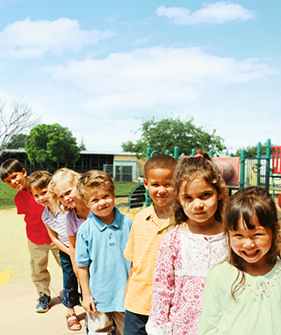
Restorative Schools
![]() Restorative Classrooms Process
Restorative Classrooms Process
![]() Restorative Justice Conferences for Serious Offenses
Restorative Justice Conferences for Serious Offenses
Restorative Practices are not "yet another new program."
They are a range of skills and options for supporting student success, based upon a philosophy of building, healing and sustaining a healthy learning community.
Restorative Schools support the social and emotional learning needs of students by working closely with teachers in their classrooms and in teacher circles to develop restorative classroom cultures. With positive classroom communities, disruption is minimized and quality instructional time is maximized. We assist administrators in exploring restorative discipline methods to enhance responses to challenging behavior. The result: trouble transformed into learning; schools that transform challenging behavior into learning and emotional growth.
 What Teachers Say--From the Spring 2010 pilot of the Restorative Classroom Process
What Teachers Say--From the Spring 2010 pilot of the Restorative Classroom Process
“Students accepted more responsibility for their roles in both creating and solving the problems. It became much easier to encourage students to solve their problems themselves, in part because I gained more confidence that students had the skills to do so, but also in part because of how the project shifted the way I communicate with my students.”
“Before the project I felt that it was my sole responsibility to solve problems and take care of issues. Now I have I can see how it makes sense to share this responsibility with students. Students shifted in the same way, from expecting me to take care of everything, to understanding that they had responsibility to help.”
“Students changed from wanting the teacher to do something and feeling angry if we didn’t, to understanding and accepting when we challenged them to use their tools to solve problems, and gave them support in their efforts to do so.”
“Students learned they can me problem solvers, and that there are many alternatives to consider in a problem situation.”
“The whole class became aware of and attuned to behavioral trends how behaviors were affecting their functioning as a group.”
“Students felt proud when their class made progress in reducing problem behaviors.”
“When students were asked to solve problems in past, they would respond “I dunno,” and I would feel responsible to come up with a solution. I recognized that these solutions were not generally effective. Now I facilitate student’s thinking process, and help them come up with solutions.”
“This project was a life-changing experience.”
“Students are much more likely to take ownership for issues affecting them and the classroom.”
“My role and how I problem solve has changed; I’m less likely to get angry as quickly. The project allowed me to come from a more loving and caring place.”
“I never cry in class. But there were some moments when I found the tears coming down.”
“I was surprised by what my students really want. I didn’t expect that they want to have a chance to help fix things, they want to be part of it. It changed my perception of the kids.”
“Things were broken and I didn’t know how to fix it. My own frustration was in the way. I noticed how cruel the kids were; it confounded me. Then in this project, to hear them voice their own pain… I was so touched; I had never cried in class before. I became more mindful that I don’t know what they walk with. I started allowing myself to see.”
Sometimes issues arise that require special attention; student conflicts that are disrupting the entire campus or that spill over into the community; parent dissatisfaction that is becoming distracting and disruptive; ongoing conflicts that staff seem to be stuck in.
Our restorative circles facilitators can help you work through these issues. You will deepen communication, develop shared understanding, understand how people and perceptions are affected by each other, and come to agreements that will move you forward.
For an example of how restorative circles work, read this story.
Circles are available by arrangement. Costs are based upon the complexity of the situation.
"I thank all of you, students and parents alike, who worked hard to establish understanding and agreements, and address the hurtful and damaging behaviors that took place. It was a time of heightened emotions, so close to graduation. Each one of us, me included, came to a new understanding and I believe that this is the heart of being a human being--how we grow and learn in order to become more effective in the world."
--High School Principal, after a restorative circle
Restorative Conferencing Services available for Sonoma County students
Restorative Resources provides restorative justice services for young offenders who commit offenses in Sonoma County. The restorative approach includes those who have been affected by crime or misbehavior in a process that is often healing for all who participate.
In school settings, those who are invited to participate include students who have been affected (for example victims of theft, assault or bullying), parents, teachers, other staff, and community resources.
The conference is facilitated by trained staff who guide participants through a process designed to create understanding and repair the harms resulting from the students’ actions.
Participants in the conference determine what reparations are appropriate for the offending student to make to the victim(s) and the affected community. With the offender's participation, an agreement is written and signed by everyone present.
Agreements are carefully monitored by Restorative Resources staff until they are complete. Over 90% of students successfully complete their agreements.
A limited number of students can be served during the school year with funding provided by Sonoma County Probation Department.
School disciplinarians may refer students who commit crimes or serious Ed Code violations.
Restorative Resources also provides consultation and training to help schools adopt a continuum of restorative practices designed to build community, encourage positive behaviors, and hold students accountable in ways that help transform disciplinary incidents into teachable moments.
For more information or to make a referral:
707-542-4244
email: [email protected]